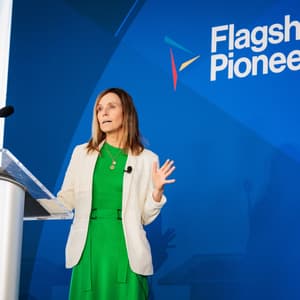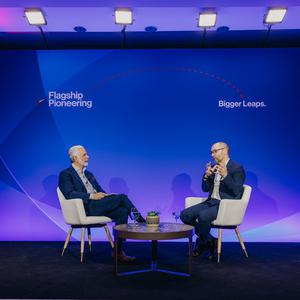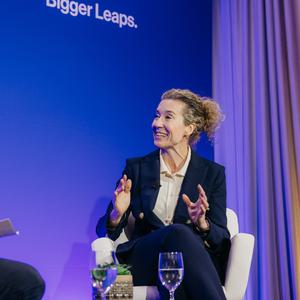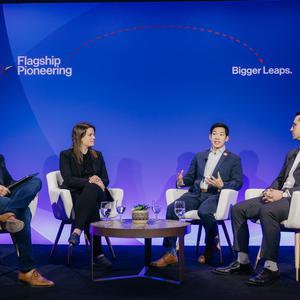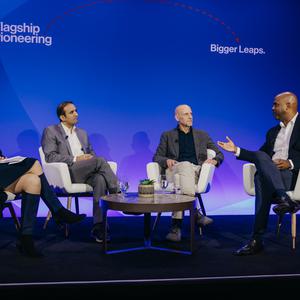By Ara Darzi & Tom Kibasi

We can imagine a world where true health security — the ability to live our lives free from disease — is a human right to be secured for all.
What if we could create a future free from disease? Over the past two years, we’ve experienced the collision of the fast pandemic of COVID-19 with slow pandemics of obesity, diabetes and other chronic disease: the nonelderly with such underlying health issues were most likely to suffer serious illness or death. Our communities have been hit so hard because we were neither prepared for pandemic threats nor had sufficient health resilience. Too many people were too vulnerable because of their poor health — but it does not have to be this way.
One lesson? We have been too complacent about disease. Our healthcare systems are actually sickcare systems: they are almost entirely focused on the diagnosis and treatment of disease rather than on protecting, maintaining or improving health. By waiting for disease to manifest, costs are higher and outcomes are worse. Even before the pandemic, many health systems operated in perpetual crisis mode, reacting to the most pressing problems.
We believe that an alternative, proactive paradigm can be built, so that people live disease-free for longer: adding years to life and life to years. We can imagine a world where true health security — the ability to live our lives free from disease — is a human right to be secured for all. The first steps toward that new era are to have the ambition to imagine it and the determination to build it. We can protect our health from external threats, such as pathogens, and consign much of today’s chronic disease to history.
We believe that an alternative, proactive paradigm can be built, so that people live disease-free for longer: adding years to life and life to years.
By focusing on the period before sickness manifests, when people are seemingly healthy, we can preempt disease. During these periods of pre-disease (before we are patients), underlying physiological changes have begun that indicate that a trajectory toward disease has commenced. By proactively detecting the novel biomarkers of a predisease state, we can find new ways to intervene to reverse, prevent or postpone disease. We call this preemptive health: the application of leading-edge biological sciences and digital technology to traditional public health goals.
By pioneering a new field of preemptive health science, we can unlock enormous untapped potential for better health. Take cancer, for example. Imagine a world in which most cancer is detected at “stage zero” before a detectable tumor has even developed — radically improving outcomes at dramatically lower cost. That’s a future that Harbinger Health, a Flagship company, aims to create with its distinctive approach to liquid biopsy. In this future, a cancer diagnosis will become a routine health problem to be addressed rather than a life-altering event to be feared.
We can preempt pandemic threats too. The modern miracle of mRNA vaccines, created in record time, have protected us from severe disease caused by the latest COVID-19 variants. Through the application of advanced machine learning, pandemic-busting, variant-proof vaccines are not a distant dream but a very real possibility in the immediate future. Flagship Labs 77 is working on a novel approach to create variant-proof vaccines, and “antibody nets” that cover not only current strains of COVID-19 but other potential variants too.
We can forge a future together where humankind is liberated from disease — so each of us flourish individually as well as collectively — as a fitting tribute to all those who have lost their lives. It is not only an opportunity, but a moral imperative.
Much of the world remains unvaccinated while industrialized nations struggle with uptake of booster shots. There are signs that vaccination fatigue may have set in where people are reluctant to take a third dose. But rather than insisting on boosters for all, governments could prioritize doses for those with low antibodies — and release the remaining shots for distribution to low-income countries. YourBio Health’s unique painless blood draw means universal antibody monitoring is possible.
New tools are being developed that will enable individuals to manage their own health by providing them with AI-enabled applications to assess their health status and determine if preemptive medicine interventions may be beneficial to avoid progression to a chronic disease.
Far superior ways to engage, involve and empower citizens to improve their own health will be central to a preemptive medicine paradigm precisely because the absence of symptoms means that participation is a choice, rather than a compulsion to alleviate pain or discomfort.
Early detection also offers an opportunity to radically change people’s relationship with their own health by empowering them to control their own health future with the information and the tools to preempt disease and reverse or manage a predisease condition.
It is an old adage that individuals do not value their health until they lose it. As a society, we have all experienced what it is like to lose our health security during this terrible pandemic. We can forge a future together where humankind is liberated from disease — so each of us flourish individually as well as collectively — as a fitting tribute to all those who have lost their lives. It is not only an opportunity, but a moral imperative.
Image credit: iStock
If you see an error in this story, contact us.

